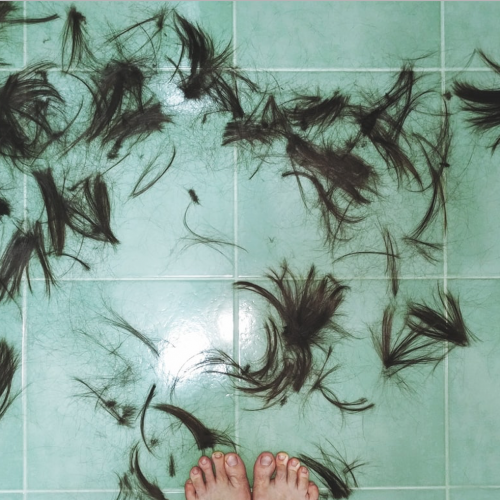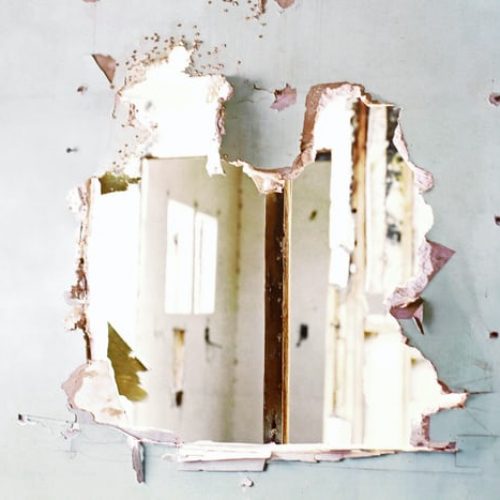The Verrazano Bridge comes at me in waves from the back seat of my parents’ car. Thick metal cables rise higher and higher until they stretch above my line of vision with the first tower, impossibly high. Then the cables dip lower and rise higher again.
Inside the car, in front of me in the passenger seat, my mother’s head turns. I see her face in profile. She is speaking to me.
“We’ll only tell Aunt Grace and Uncle Sal,” she says.
The metal cables keep rushing past.
“Okay,” I say. I am obedient in most things, and especially in this.
My father, driving, says nothing.
I understand that we will tell no one else my diagnosis. We do not share shameful information with others. I am twelve years old in January of 1980 when I take on this secret. I keep it for the next ten, twenty, thirty years, holding it in my body even as it leaks out bit by bit for all the world to see.
It began the year before, with the clarinet. The sixth-grade band teacher, a squat woman with her hair in a tight bun, was not pleased with me. I couldn’t blame her. Something had to be strange or wrong about a bright girl who could read music and play guitar but couldn’t get a sound out of a clarinet. Maybe it was my braces, people said. But other girls with braces played the clarinet just fine. The sixth-grade band teacher put me in the back of the room to play the snare drum but didn’t tell me how. My mother took me to the orthodontist.
Weak muscles around the mouth. Who had such a thing? Why couldn’t I have something cute and socially acceptable, like a lisp, like my little sister and Cindy Brady? The orthodontist’s speech therapist gave me a series of humiliating mouth-strengthening exercises. I told no one about them. I kept strange gear in plastic bags in the night-table drawer in my room where, after school each day, I held a tongue depressor between my lips and balanced quarters on the end of it; I put a button behind my lips and pulled on the damp string attached to it; I attempted to whistle.
None of it worked. At the end of the sixth-grade spring concert, when we all stood up to bow, I bumped into the snare drum, and it went clattering to the ground.
From the speech therapist to the pediatrician to a special neurologist a long drive away: over the Verrazano Bridge, through Brooklyn and Queens, across a smaller bridge up into the Bronx. Walk on my heels, walk on my toes, raise my arms in the air, touch my nose, touch his moving finger, squeeze his fingers, smile as wide as possible, try to whistle, close my eyes tight. Don’t let him open them. They opened easily at his slightest tug.
Long drives back and forth across the Verrazano. A needle into my biceps with an electrical pulse going through, and my hand jumped on its own. A needle into my upper lip with an electrical pulse going through, and I taught myself to leave my body when staying in it was not an option.
Surely only the weirdest of weird girls would have to have such weird tests. Seventh grade began. In homeroom, the kids passed around a tattered copy of Wifey and drew the logos of rock bands on their denim binders. I had a denim binder. I drew on it. Flowers and hearts, my emblems for normal, for pretty, for orderly and right.
In January of 1980, the neurologist tells me where I belong. I am one of Jerry’s Kids. A type almost no one’s ever heard of, where the muscular dystrophy starts in your face. He can’t say what will happen to me. I might be mostly fine; I might be crippled. I reject everything he says, every category, every scrap of it.
After that visit, after my parents and I cross the Verrazano, we never say “muscular dystrophy” again. On rare occasions when something must be addressed, my mother refers to it obliquely as “your problem.”
At fourteen, I wear sultry eye shadow and tight clothes, and pink earrings that match my frosted pink lips. When I can no longer lift my right arm, I find ways of hiding this. In gym class, I get my partner to lie about the number of sit-ups I can do so I won’t fail the class.
At sixteen, when I have a boyfriend, I don’t tell him.
At eighteen, when my neurologist says I should wear leg braces, I say (in my head) fuck you, and I limp around and trip over my toes a lot. In my twenties, I see myself in a video and what I look like walking, and I get the braces and walk more smoothly, without falling. For a little while.
And when there are men, ordinary men, who are attracted to me and love me, I accept it, but I don’t understand it.
And in my thirties, when my spine curves deeply, and my stomach sticks out far in front of me, and my butt sticks out far behind me, and all clothing looks strange on me, I want to die. And in my forties, when my hands stop working properly, I want to die more. But I don’t, and I keep working at my job, and no one says anything, and I don’t say anything.
Until one day I have to. And then I call my reluctant bosses into a meeting. And I explain: Leaving a handrail broken is not an option. A handrail is a right and not a favor. And I speak until they listen. And I will speak again whenever I have to.
Because I finally notice the others. The ones not in medical books with black bars over their faces, but on streets, on screens, on microphones. They speak, they have been speaking, their numbers are growing. They are living in their bodies.
That day on the Verrazano Bridge still comes at me in waves. I see my mother’s head turn. She is speaking to me. But now other voices come out. I still do not live in my body, but I hover somewhere nearby.

Laura Maffei
Laura Maffei received her MFA from the Michener Center for Writers at the University of Texas at Austin. Recent stories have appeared or are forthcoming in La Piccioletta Barca and The Halcyone. Her book of tanka poetry, Drops from Her Umbrella, was published by Inkling Press of Canada. She was the founding editor of the poetry journal American Tanka.





